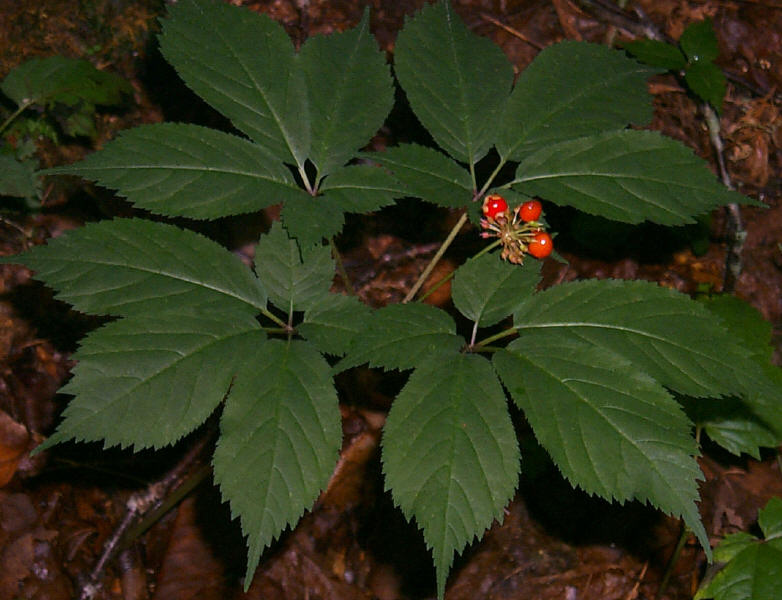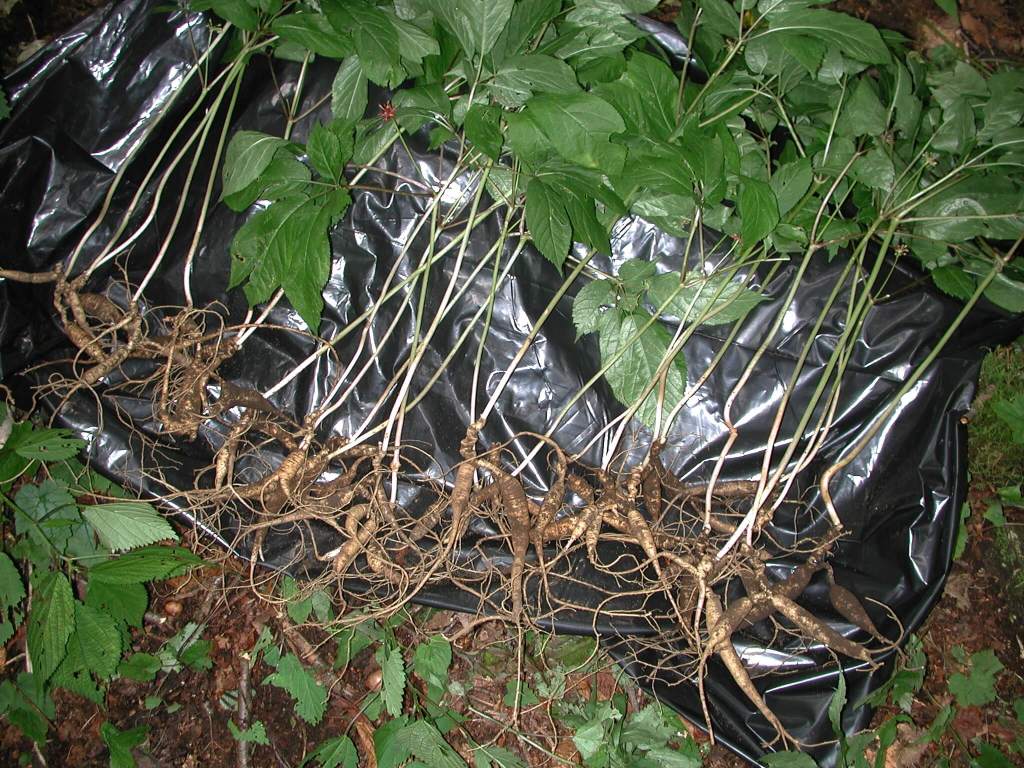A common ingredient in your favorite energy drink grows wild in the mountains of North Carolina, and it’s worth so much, you have to win a lottery in order to harvest it legally. Pisgah and Nantahala National Forests have opened their annual lottery for permits to harvest wild American ginseng.
People use ginseng for a variety of reasons: to potentially stay awake, lower blood pressure, increase mental clarity or reduce heart disease risk, to name a few. Much of the scientific research hasn’t yielded sufficient evidence on the effectiveness of the root, but it’s been coveted in Asia for centuries because of its reported benefits. The popularity of ginseng in China has resulted in a robust market for American ginseng, which has a similar appearance to Asian species used in traditional remedies. But that robust market has led to overharvesting and poaching, and populations of wild ginseng plants found in the Southern Appalachians are on a sharp decline, according to North Carolina National Forests.

Photo Credit: Gary Kauffman
“There are a number of herbs that are being harvested on national forest land, but nothing along the scale of ginseng,” says Gary Kauffman, a botanist for North Carolina National Forests. “Because of the long history and the massive demand for the root, no other herb can get the return rate of ginseng.”
Ginseng is a native plant that grows wild throughout the eastern U.S. and Canada, and it can be harvested in 19 states. In North Carolina, it’s found mostly in the mountains near the Tennessee border. It’s been harvested in the area since the mid-1700s and has traditionally been shipped to Asia, where the herb is used for medicinal purposes. According to the U.S. Fish and Wildlife Service (FWS), which issues exporting permits for the root, most of the plants harvested in the U.S. are still shipped to Hong Kong and China, and prices for the wild plant have risen significantly in the last 10 years. Kauffman says harvesters can get between $500 and $1,000 per dried pound of root, and the FWS estimates the wholesale value of wild American ginseng roots at around $27 million per year. The increased market for ginseng puts increased pressure on the plant throughout its natural habitat, which could be problematic for the species’ longevity.
“When you harvest ginseng, you kill it,” Kauffman says.
Unlike harvesting fruit or mushrooms, the root of ginseng is the valuable component, so you have to remove the plant from the soil. Although ginseng fetches a high price per pound, it takes roughly 300 plants to make up a dried pound of ginseng, which is how it’s sold. The U.S. Forest Service says it’s difficult to estimate the exact rate of ginseng’s decline in North Carolina’s mountains, but based on anecdotal evidence, the Forest Service believes the native ginseng population has dropped drastically in the last few decades.
“We look at historical accounts of people harvesting ginseng in the area and the amount that’s being sold on the market, and we can get a sense for how much is being harvested legally and illegally,” Kauffman says. “I’ve seen accounts of families setting up camp in one cove for a whole summer and all of the kids and parents digging for ginseng day after day.”

Photo Credit: Gary Kauffman
Whereas some national forests along the eastern seaboard have banned ginseng harvesting all together, North Carolina National Forests instituted a permit system in the ‘80s. Then in 2012, it reduced the number of permits by 75 percent and began the lottery system, issuing just 136 permits a year. Even though the Forest Service can limit the number of people who harvest the root legally, they have little control over the number of people poaching ginseng out of season and without a permit.
“It’s impossible to completely police it,” Kauffman says, adding that each law enforcement agent for the Forest Service in North Carolina is responsible for policing 150,000 acres of forest. And most ginseng grows in remote locations that officers can’t easily reach. “We’ve contemplated banning it outright because there isn’t much indication that we’re making a difference in the illegal harvesting of the plant. But with the money from the permits, we’re trying to develop seedbeds so we can augment existing populations and establish new populations in appropriate habitats.”
The lottery for a ginseng permit runs through Friday, July 20, so there’s still time to land one of the 136 spots. You have to call or visit a ranger district office to apply for a lottery spot (no email submissions). If you get a permit to harvest ginseng in Pisgah or Nantahala National Forests, you’ll be notified by a letter before August 17. The harvest season runs from September 1 to September 15.
What You Need to Know About Harvesting Ginseng
- Removing ginseng from a National Forest without a permit is illegal and may result in a $5,000 fine, a six-month sentence in federal prison, or both.
- Do not harvest ginseng in designated Wilderness areas.
- Only harvest plants that are at least five years old, which will have at least three leaves. Kauffman recommends only harvesting plants that also have red seeds.
- Replant the seeds in the same spot you harvested the original plant from, burying the seeds one inch beneath the top of the soil.
- Permit holders are allowed to collect up to three pounds of wet ginseng per year.
